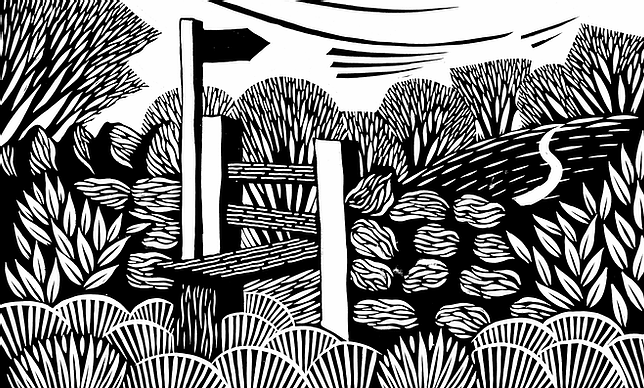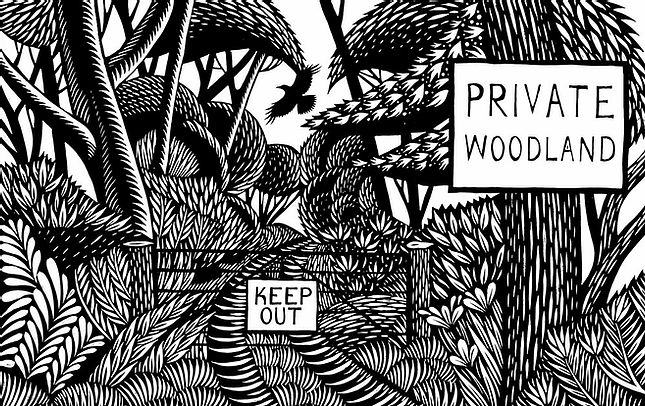Nick Hayes is an artist, illustrator, campaigner and activist for land access rights, and author of several graphic novels, as well as The Book of Trespass (2020). In August 2020, along with author Guy Shrubsole, Nick launched a new campaign on addressing the Right to Roam in England with an open letter to the Prime Minister, signed by over 100 authors, musicians, actors and artists. In July 2021, the pair collaborated with David Bangs to organise a mass trespass on the Brighton Downs to raise awareness of the failings of the 2000 CRoW act, and the inequality of land access.
Nicola Chester was one of the signatories of that letter and, like Nick and Guy, hails from West Berkshire. Her book (a memoir) On Gallows Down; Place, Protest and Belonging is published by Chelsea Green on 7th October, 2021. Here she interviewed Nick Hayes, and the two mulled over land access, trespass as protest, and why the Right to Roam campaign is seeking a ‘total reboot’ of our relationship to nature.

Illustration by Nick Hayes, via righttoroam.org.uk
NC Coming from West Berkshire along with Guy Shrubsole (fellow Right to Roam campaigner and author of Who Owns England?) we share a lot of common and contested ground, Nick! Not only the literary influence of Watership Down, The Wind in the Willows and Adam Thorpe’s Ulverton, but also a rich seam of protest — from religious martyrs to the Civil Wars that prompted an injured soldier to co-found the 17th Century Levellers movement, to 18th Century protests over land ownership, William Cobbett and the Swing Riots, to the Greenham Common Peace Women and Newbury Bypass protesters. Has that inspired you directly? You say that Windsor’s ‘Herne the Hunter’ seems to have influenced the ‘spirit of sedition in Berkshire.’
NH Growing up, West Berkshire meant almost nothing to me. It was just the backdrop to the fun I had with my friends. It was only when I came back home at 27, to draw my first graphic novel, that I began to wander the countryside for the countryside, and not just as a space outside of adult authority. West Berkshire is arguably the worst county in the whole world – it was where much of the colonial plunderers of the East India Company came to retire, it had a fox hunt so infamous that the cockneys used it as a rhyming slang for the most brutal word in the English language: berk is short for ‘Berkshire Hunt’. But learning about the ecology of the place, the folk songs, legends, and traditions, offered a new understanding of the place, that wasn’t defined by the people that owned it, but instead by the rest of us. The same is true of England.
NC The pandemic brought the inequality of access to nature into sharp focus. Through the lens of your Right to Roam campaign, I can see how the string of protests that followed, from Black Lives Matter, Extinction Rebellion and Against HS2 Rail Link, to the safety of women out on their own (sparked by the murder of Sarah Everard) and the Police, Crime, Sentencing and Courts Bill (that criminalises trespass) can be linked partly to access to nature. Public responsibility to nature and the planet, and engagement with nature, has never been more urgent. Might the trespass movement and the Right to Roam save us? Make us a gentler, more considerate and inclusive society?
NH Yes (!) No one’s saying we’ve found a silver bullet for the ills of society; right to roam is not going to solve world poverty. But every strand of society, globally, not just in England, is deeply linked to our rights to land; who has them, who doesn’t, who rents them, who has to pay. One in eight families in England don’t have access to a garden. Those 3.3 million people are, obviously, also from an impoverished background, and overrepresented by the BPOC community. Access to nature is access to our mental and physical health, not to cure our ills, but as a means of alleviating their symptoms, and preserving a healthy lifestyle rather than fixing its opposite. Removing the right of exclusive dominion that land owners enjoy, or rather, overriding it with a public right of access to nature, would also send a great sign that age old (millennium old) structures of inequality are finally changing, that the nation is for everyone, and not just those that own it. Which is why there is such resistance to it in certain circles. In that respect, yes, I think it could be a turning point.

Illustration by Nick Hayes, via righttoroam.org.uk
NC I’ve really admired how well you – the Right to Roam, and Landscapes of Freedom campaign – have considered and countered the arguments against trespassing. The fear and accusations of littering, loutishness, disturbance of wildlife, livestock and farming is ‘othering’ and presumptive. Farmland and ground nesting birds, for example, have not disappeared due to walkers, but how we expect our farmers to farm. Could more freedom to roam lead to change? To better engagement and understanding of farming and conservation on both sides of the fences?
NH That’s exactly the plan, and it does exactly that in all the countries across Europe who practice a Right to Roam – Scotland, Norway, Sweden, Bavaria, Finland, Estonia, to name just a few. We’re not just looking for a few extra acres for ski pole ramblers to walk, we’re looking for a total reboot of our relationship to nature. We want people to learn about the countryside code, the respect and responsibility we owe not just to the countryside, but the people who work there, by actually being in it. We think that walking in a straight line, which is the sum of what we’re allowed to do in our country, is incredibly restrictive, and limits the myriad ways we could interrelate with nature — we want to promote citizen science, the monitoring of invasive species, countryside crafts, and promote that reciprocal relationship of the commons, that sees an improvement in our nation’s health as one and the same thing as an improvement in our environmental health.
NC I know I’m probably coming over all a bit fangirly here, but The Book of Trespass, along with Guy Shrubsole’s Who Owns England, the Right to Roam Campaign (which I am proud to support) and the Landscapes of Freedom’s Mass Trespass over the Brighton Downs, feels like a historical turning point: one that initiates, in a post-pandemic time of inequality, wildlife & climate crisis, a new movement for thoughtful engagement & responsibility for sharing access to the land. The Brighton Downs Trespass in July this year — done so sensitively, carefully and inclusively — was the largest mass trespass since Kinder Scout in 1932, that partly led to the designation of Britain’s National Parks. What would you like to see come of all this?
NH Very simply, change. Campaigning is exciting and rewarding, but it involves way too many emails and zoom meetings for my liking. Both me and Guy just want this done, we see our opportunity, and are going for it hammer and tongs until we burn out. But neither of us want to turn our campaign into an office, an NGO and a permanent fixture. Guy’s got big plans, he wants to re-introduce rainforests to England, he’s also got a proper bee in his bonnet about pesticides, and I just want to sit around the countryside drawing. But neither of us are doing any of that until the rivers, woodlands and greenbelt are free for public access. Step one is complete, the books did that: raise the conversation. Now we have to shape the conversation, and apply pressure — therefore, next year will be all about trespassing, asking small local groups to go and trespass the grand estates of their area. The next book, The Trespasser’s Companion, will be out on 24th April next year, the 90th anniversary of the Kinder Trespass. Hopefully, with what’s inside it, with what it asks of its readers, the book’s publication will be a direct action in itself.
*
This is an edited extract of a much longer piece, sent out this morning exclusively to Middler and Lunker-tier subscribers as September’s long-read. Take out a subscription here, or log in to your Steady account, to read the piece in its entirety.
We’re chuffed to share the news that Nicola is joining the lineup for our Camp Good Life stage, where she will be interviewed by Melissa Harrison about her forthcoming book. Though the festival is officially sold out, a handful of tickets have been held back especially for Caught by the River readers — available here. Don’t forget that Lunkers can cash in a 30% discount!